 Ofcom released a consultation paper in June 2023 outlining a number of possible licence condition changes. These represent a major change for UK radio amateurs.
Ofcom released a consultation paper in June 2023 outlining a number of possible licence condition changes. These represent a major change for UK radio amateurs.
The Ofcom consultation is now closed, but in order to gauge how the UK amateur radio community views the changes proposed in the Ofcom consultation, Essex Ham ran an online survey between 24 June and 03 September 2023.
461 complete responses were received, and here are the results:
| Ofcom has proposed to allow each amateur to only hold one personal licence, surrendering all but one licence, and revoking a licence once progressing to a higher level.
Do you agree with Ofcom’s proposal that each licensee should only be able to hold one personal licence? |
||||||||||
|
|
Question 2 (section 3): Supervised use |
||||||||||||
|
To allow the hobby to be showcased, Ofcom is proposing that anyone should be able to use the radio equipment, providing that this is under the direct supervision of the licensee (at any level) Do you agree with Ofcom’s proposals to permit greater supervised use of the radio equipment by others? |
||||||||||||
|
||||||||||||
|
Question 3 (section 4): M8 and M9 Call sign |
||||||||||
|
Many view the 2×0 and 2×1 callsign format for Intermediate as “clunky”. Ofcom’s proposing M8 and M9 for Intermediate. Do you agree with Ofcom’s proposal to use M8 and M9 for Intermediate licensees going forward? |
||||||||||
|
|
Question 4 (section 4): RSLs |
||||||||||
|
This is one of the more controversial proposals – to make the Regional Secondary Locators (e.g. Scotland “M”, Wales “W”, Northern Ireland “I”) optional, and allowing those in England to add an optional “E”. Do you agree with Ofcom’s proposals to change its policies on the use of RSLs? |
||||||||||
|
|
Question 5 (section 4): Suffixes |
||||||||||
|
Another one that’s divided opinion – removing references to /M, /P, /A, and allowing any suffix after a callsign. Do you agree with Ofcom’s proposals to allow the use of any suffix? |
||||||||||
|
|
Question 6 (section 4): Change call sign |
||||||||||
| This is the most controversial and in two parts: a) old callsigns can be reissued after being revoked for 2 years (including SK callsigns), and b) allowing amateurs to change their callsign every 2 years if they wish.
Do you agree with Ofcom’s proposals to allow a change of call signs? |
||||||||||
|
|
Question 7 (section 4): Call sign limits |
||||||||||
|
Ofcom’s proposing that each amateur is only allowed to hold one callsign. Clubs can hold a maximum of 5. Do you agree with Ofcom’s proposals on the limits to how many call signs can be held? |
||||||||||
|
|
Question 8 (section 4): Special event call signs |
||||||||||
|
This one is for those involved with GB special event callsigns – allowing more flexibility on location and how often they can be used, plus allowing for longer callsigns. Do you agree with Ofcom’s proposal to simplify special event call signs? |
||||||||||
|
|
Question 9 (section 5): Increase transmit power |
||||||||||
| It’s being proposed that Foundation goes from a maximum of 10 to 20 watts, Intermediate from a maximum of 50 to 100 watts and Full from a maximum of 400 to 1,000 watts
Do you agree with Ofcom’s proposals to increase transmit power? |
||||||||||
|
|
Question 10 (section 5): Remote operation |
||||||||||
|
It’s proposed to allow Foundation and Intermediate to be able to use the Internet for remote control of radio equipment, something previously only available at Full. Do you agree with Ofcom’s proposed changes to remote control operation? |
||||||||||
|
|
Question 11 (section 5): Beacons |
||||||||||
|
Changes for those who run beacons – to be able to do so for some beacons without applying for an NoV Do you agree with Ofcom’s proposed changes to Beacon operation? |
||||||||||
|
|
Question 12 (section 5): Gateways |
||||||||||
|
Gateways and hotspots have increased in popularity. To reflect this, it’s proposed to make this easier and do away with the requirement for an NoV. Do you agree with Ofcom’s proposed changes to Gateways? |
||||||||||
|
|
Question 13 (section 5): Repeaters |
||||||||||
| It’s proposed that Intermediate and Full can deploy a repeater without the requirement for an NoV (under 5 watts), or over 5 watts if granted a callsign by RSGB
Do you agree with Ofcom’s proposed changes to repeaters? |
||||||||||
|
|
Question 14 (section 5): Foundation Licence |
||||||||||
|
Allowing construction (transmitters) at Foundation, and allowing access to 2.4GHZ and 5GHz frequencies. Do you agree with Ofcom’s proposed changes to allow Foundation Licence holders to build their own equipment and access the 2.4 GHz and 5 GHz frequency bands? |
||||||||||
|
|
Question 15 (section 5): Airborne use |
||||||||||
| Allowing limited airborne use (500mW EIRP on Primary bands)
Do you agree to Ofcom’s proposals to permit some limited airborne use? |
||||||||||
|
Overall Opinions
We asked for overall impressions of the proposals – here are the results, plus a breakdown of how people responded by the length of time that they have been licensed:
| These are generally sensible changes | 70.0% |
| Ofcom could have gone further to make things simpler | 18.6% |
| Ofcom has gone too far and made things too simple | 8.7% |
| Other | 2.6% |
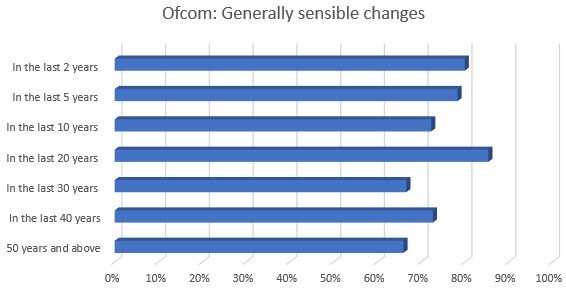
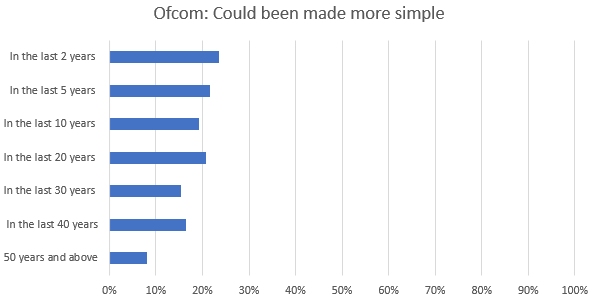
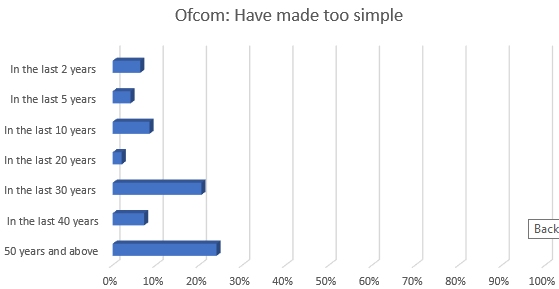
Survey Demographics
For information, here is a breakdown of the survey demographics:
|
Respondent’s Licence Level |
Number |
Percentage |
|
Foundation |
132 |
28.6% |
|
Intermediate |
74 |
16.1% |
|
Full |
242 |
52.5% |
|
Non-UK |
2 |
0.4% |
|
Not licensed |
11 |
2.4% |
|
When was respondent first licensed? |
Number |
Percentage |
|
In the last 2 years |
110 |
23.9% |
|
In the last 5 years |
97 |
21.0% |
|
In the last 10 years |
47 |
10.2% |
|
In the last 20 years |
48 |
10.4% |
|
In the last 30 years |
39 |
8.5% |
|
In the last 40 years |
55 |
11.9% |
|
In the last 50 years and above |
50 |
10.8% |
|
Not licenced |
13 |
2.8% |
|
No answer |
2 |
0.4% |
Responses by licensed-length
In response to requests, we have included some data about how various demographics answered. In our survey, we also asked how people felt about the exam syllabus and what should be tested on today’s exams. Here are the results, split by “when were you first licensed?”:
“I’d like to see exams made easier”
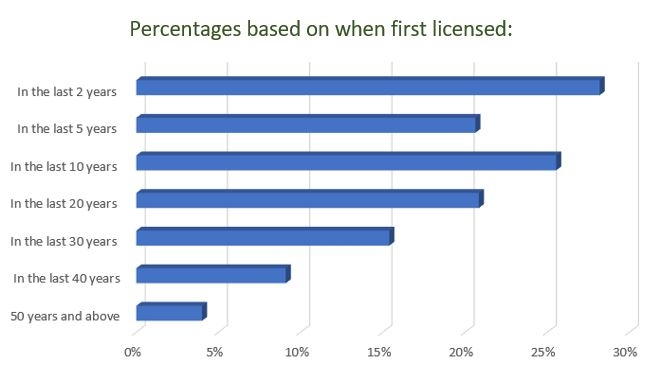
“I’d like to see exams made harder”
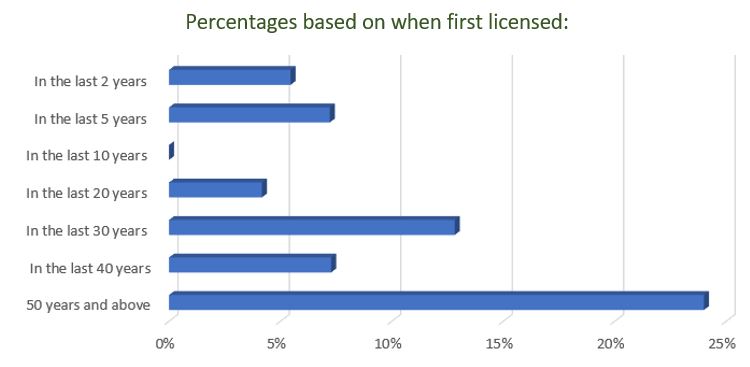
“The RSGB’s has “watered down” exams and syllabus too much”
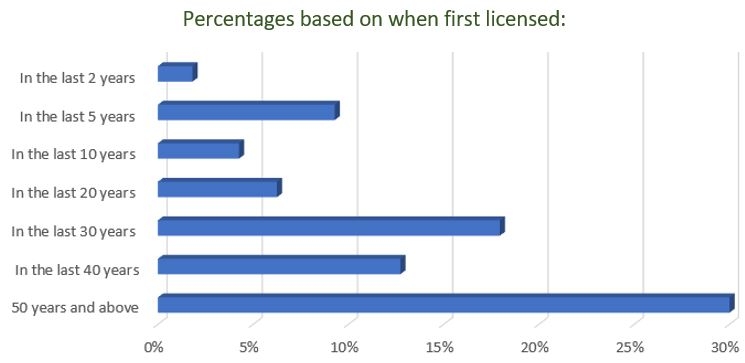
“The RSGB’s exam syllabus is bloated and needs to be slimmed down”
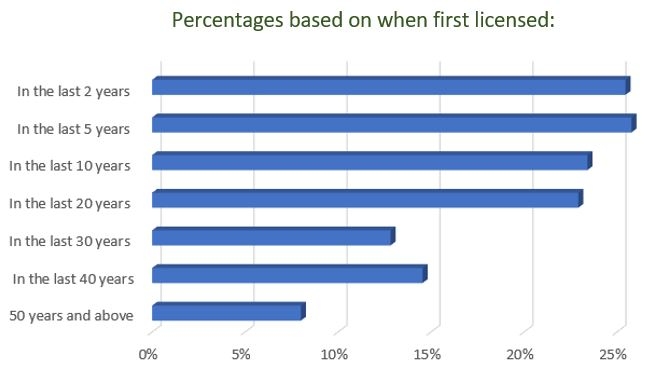
“Exams should have more content around operating procedures”
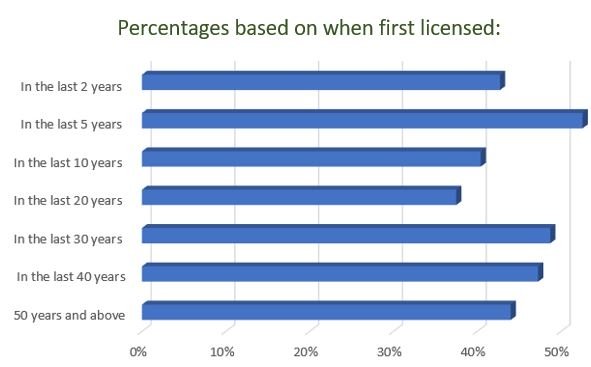
“Exams should have more theory-based content (electronics, RF, etc)”
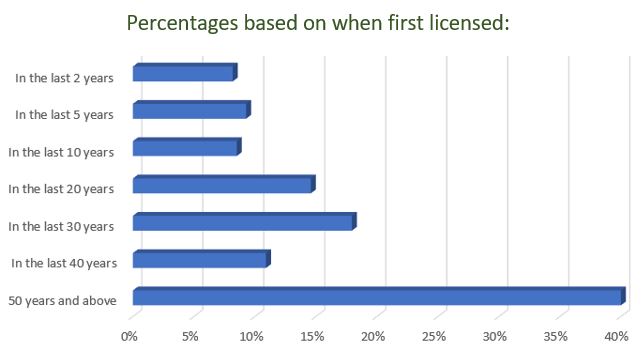
The full submission has been sent to those who requested a copy when completing our survey. This includes samples of some of the comments raised for each question. It is available to our community members here: Essex Ham’s Submission to Ofcom
Handy Links
- Essex Ham’s Ofcom Consultation Page
- Ofcom Consultation Page
- Read the RSGB’s response to Ofcom
- Join Essex Ham for updates to licence changes
What’s Next?
The consultation closed on the 4th of September 2023. As we understand it, there will be a policy statement released by Ofcom by the end of 2023, and we could potentially see some of the changes taking effect in the first half of 2024.
Got any thoughts? Please add a comment below…

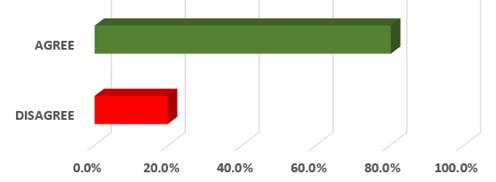
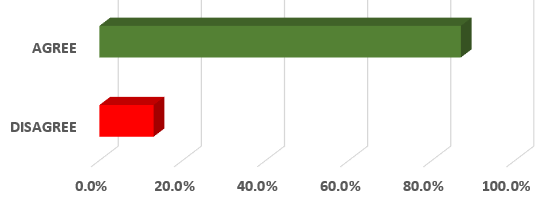
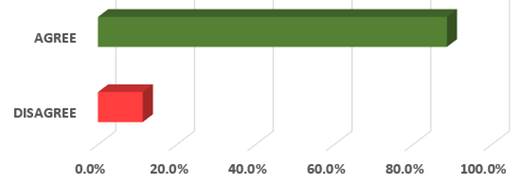
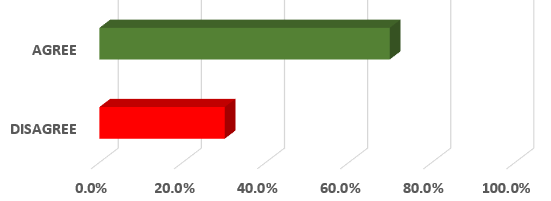
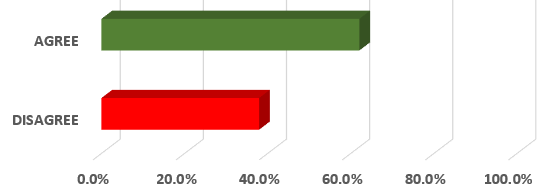
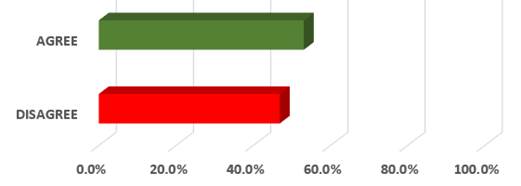
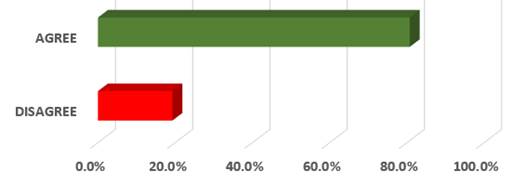
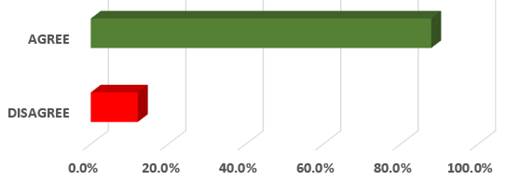
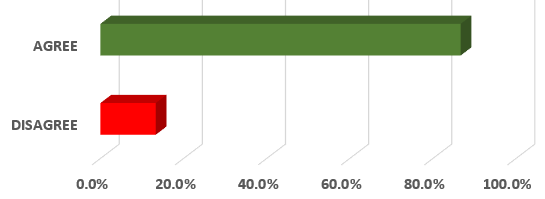
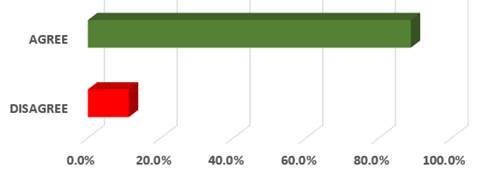
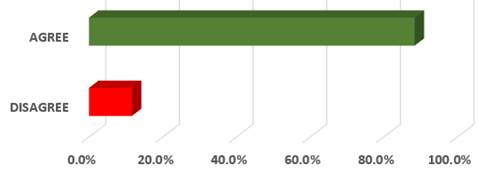
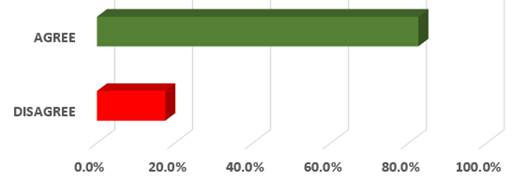
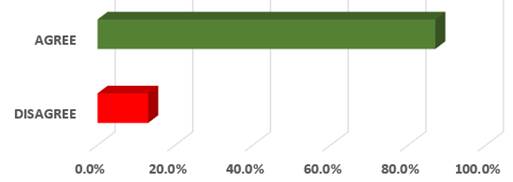
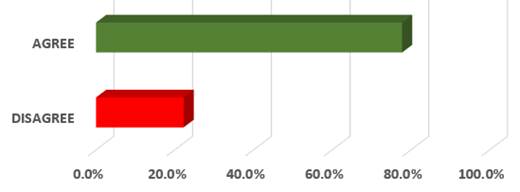
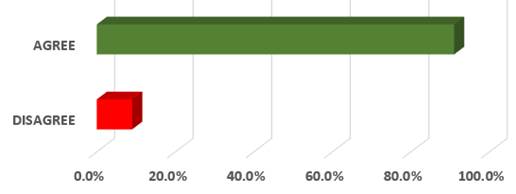

very interesting read ! if they took time to read it ? some will some won’t !!
thank you!!!!
Very interesting , thankyou for taking the time to do this pete . I am VERY naughty and didn’t reply to ofcom’ s proposed changes survey , or yours come to that . Sorry . So rightly so , when things change i might not agree with , or like , I can’t comment or complain .
But I have read the document a few times over since being published , and listened on nets and at club meetings with our region 12 rep , and chats in general . And like your survey , I’m in all the “agree/strongly Agree” areas . In all I feel it’s making the hobby a lot more accessible to non ( yet , but hopefully ) hams to “try before you buy” into the hobby . Also making it easier and more enjoyable for present hams to explore more of what’s out there in the hobby , that licence levels may have prevented use of . In all a much more user friendly hobby than before . Dorothy M0LMR
No way shall I be “surrendering” either my Foundation licence, exam taken during lockdown, OR my G7. Both represent an. achievement, and I should be able to use both, subject to applicable rules for each licence.
That is what I told Ofcom.
Remember that you are licence holder rather than owning it, so will be subject to Ofcom’s rules if they change. These will apply to everyone so it won’t be an unfair process.
It’s really good that the majority of people showed a positive response and hopefully get a bit of new interest in the hobby.
Do you have a breakdown of the consultation answers according to age and length of time licence held? It would be interesting to see.
Hi Austin – we captured “licence level” and “how long have you held a licence”, so we do have that data on a per-question basis. I’ve added a breakdown for the exam-related questions. Were there any particular questions you wanted to know the breakdown for?
I was pleasantly surprised at the degree of near-unanimity in most of the questions, the only ones that were noticeably different were the RSL and suffix questions. I think that bodes well for amateur radio in the short to medium term, the real test will be when the older amateurs fall off their perches at a higher rate.
It would be interesting to see a breakdown of the country of respondents. Would RSLs be more ‘popular’ in parts of the UK that already must use them?
Seemed to be mostly lower level licensees wanting more power, more privileges and easier exams. What is the point of becoming a full, if full privileges are going to be eroded like the suggestions in this proposal? Also I feel the “I don’t know/don’t care” option was completely pointless and skewed the results slightly as people had an option not to answer the question, the Ofcom proposal did not have this option.
Not really… as you’ll see from the overall results graphs, the changes have been seen as positive by just about every demographic – the proposed changes are least popular with the 50 amateurs who’ve held their licence for 50 years.
I’m not sure how you’ve come to the conclusion that Ofcom didn’t allow “Don’t know / Don’t care” in the consultation – there was a clear opportunity to NOT answer each question! Also, it’s useful to know that 1 in 5 amateurs don’t care about gateways or airborne, so we can see what people care and don’t care about.
If you look at the graphs under each question, you’ll see “agree” vs “disagree” (without “don’t know/don’t care)… these are the un-skewed results!
As for progression to Full – if you want more people to progress to Full, then the answer is to make the exams more relevant and a pass more achievable. Exams have got more difficult with each revision. A pass at Full today is much harder to get than an old-style RAE pass (which would be an Intermediate pass with today’s exams). Increasing the difficulty of exams, as some are requesting, will surely result in fewer passes and less people progressing, no?
It’s very odd that your solution to getting more people into this hobby, is to dumb it down. This is a technical hobby right?. The sense of achievement I felt when I passed my Full exam was glorious. I was so so proud of what I had done, and I was still buzzing about it 2 weeks after receiving my result.
Yes you are right, everyone had an opportunity to not answer the proposal questions, but why take part of a proposal survey if you are not going to answer the questions. I understand your reasoning of trying to establish the general feelings/care level of participants.
Anyway it’s done now, and I appreciate your efforts in compiling this survey, thank you. It’s interesting to see the overall thoughts of everyone who participated in the survey. It’s a shame a major entity like the main radio society of GB didn’t do likewise.
Several bits to unpack there. In your first comment, you were talking about progression to Full. My comment was suggesting that continuing to make it more and more difficult to pass Full, is going to reduce the number of people who pass Full. I fail to see how continuing to increase the difficulty will encourage a higher progression. The syllabus grew quite considerably with the 2019 update and exams got harder – as a result, a much-reduced number of people progressing to Full. I fail to view that as a “good thing” for the hobby.
There is a big difference between “dumbing down” at Full, vs making Full relevant and achieveable. There is an international standard (HAREC) and it’s recognised that the UK’s Full is harder than most other countries, and it’s getting harder with each revision. Stuff is being taught that is potentially of very little use to the majority of today’s amateurs. Rather than examining on a piece of specialist theory that’s to 1% of candidates, why not ask questions on something that’s relevant to the majority?
Yes, this is a technical hobby, but there is a key phrase in the Ofcom licence: “self-training in radio communications”. I see this as something that is ongoing throughout people’s time in the hobby – i.e. more than passing a 2-hour exam. Full licence holders should be free to “self train” in areas that interest them, once they have demonstrated they reach the Internationally-recognised standard. There are some amazing amateurs out there who happen not to be academics, good with exams, or remembering obscure facts – Is increasing the bar to keep such people out of the hobby that’s in decline a smart long-term move?
As for surveys – the assumption I was trying to explain is that not everyone cares passionately about every single aspect of the hobby. People who run, say, beacons or gateways are likely to have strong feelings about licence changes that affect beacons and gateways – whereas others may not care about changes to beacons, but may care passionately about RSLs. To me, answering “I don’t know” in a 17-question survey as a response to a subject that I no nothing about, doesn’t seem unreasonable.
“A pass at Full today is much harder to get than an old-style RAE pass (which would be an Intermediate pass with today’s exams).”
I got my Class A license a good many years ago. I was still at school and had to get the head teacher to sign a permission to attend the RAE course at the local college. I studied hard for it and passed the RAE first time and took the morse test and also passed that.. After being quite active for some years life got in the way and it lapsed.
Recently I’ve got back into Amateur Radio and really valued what I learnt earlier on. Ofcom were very helpful in reinstating my original license. I was interested in todays exams so just for fun and to convince myself that i could still do it, I’ve been doing all the mock exams I can find.
I also found a PDF copy of the very RAE exam I sat all those years ago which was of course a full written exam.
My conclusion was without a doubt the Full license exam is less vigorous than the RAE written exam was, You had to understand and explain theoretical concepts and draw schematic diagrams as opposed to ticking options in a multiple choice answer form.
I’m really interested in why you say the current Full license is harder to get than the old RAE? Because with respect I just dont agree! Sorry not trying to be argumentative but I really believe its simpler now days.
One more observation. I’ve taken many academic exams and tests in my life and one thing I’ve learnt is that multiple choice exams are very fickle. It’s very difficult to bluff your way out of something that you dont fully understand in a written answer. However, in a multiple choice answer even if you dont know the exact answer you can often increase your chances by elimination of the negative responses and get a pass. But I really do believe its easier now than the RAE days
Good question. For most people, getting a Full today involves 3 exam sessions and 130 questions on a much broader syllabus than under RAE (digital modes, SDRs, EMF, A-to-D, etc), and under RAE, courses were plentiful. Until Covid hit, anyone getting Full from 2003 has to be assessed on around 20 practical activities, as well as learn the theory.
Take a look at https://www.essexham.co.uk/rae-exam-reviewed.html for a direct comparison.
As a very new foundation licence holder with no real interest in building anything other than various attenas. I find it ridiculous that to pass my exam I have to know a filament bulb will light up regardless of battery polarity. I also have to know that from time to time I have to check if my equipment is causing interference but I have no idea how to do that as it is not covered in the syllabus. A lot of the questions you actually get to look up the answers in the little booklet. You don’t actually have to know very much.
Yes, there are plenty of odd and unhelpful things in the syllabus. It still amazes me that you’re required to memorise the height of the Ionosphere at Foundation, but topics like Q codes, contests and satellites is deemed by RSGB as “Intermediate” level.
Yes some oddities in there but I’m not keen on any further syllabus reviews to address them beyond the Deletion and Amendment of syllabus items (by next Spring?) required by the new licence conditions.
When any syllabus review take place there is always a tendency of some to dream up all sorts of new items to add resulting in the inevitable syllabus bloat.
One thing I’ve never understood on the Full syllabus is the reason for item 7H1 “Recall the process for obtaining a special event call sign”. If someone wants to apply for a Special Event callsign then they’ll look at the RSGB or Ofcom sites and figure out the process themselves or else just ask a friend, there no need to teach and have exam questions on the subject.
I don’t remember there ever being a specific syllabus item/exam questions for Foundation regarding the process for obtaining a licence so don’t understand why one is needed for Full
Thanks for your hard work in running this survey, Pete! Essex Ham does excellent work for our hobby.
One of the issues I had with responding to the OFCOM consultation was that they wanted a straight ‘yes’, or ‘no’, answer to all questions, despite most questions being formed around many individual points of proposed change. I ended up answering ‘no’ to a lot of questions, despite my being in broad agreement with many of the underlying points and the thrust of the exercise overall (greater scope for experimentation, less red tape, etc.). I though better to do this than generally answer ‘yes’, in case the OFCOM assessment system were to just take note of the ‘yes’ and not read any further.
On the basis of the Essex Ham survey, all of the changes proposed by OFCOM will go through ‘on the nod’. It will be interesting to read responses in due course and to see if OFCOM make ANY revisions as a result of feedback received.
I wonder if we will get to find out how much of a hand RSGB had in suggesting, perhaps even authoring, changes for OFCOM to promote?
RSGB submitted in total 19 pages of comments on the proposed licence so reasonable to assume they didn’t actually “author” the proposed changes.
Hopefully most of the improvements RSGB and others suggested will be incorporated. We now just wait, think Ofcom were aiming to issue their statement by Christmas so maybe new licence will take effect Jan 1 or Feb 1 ?
Yes I did same as you and only replied “Yes” if I agreed with everything covered, for most questions it was a “No”, the automatic filtering they are using may mean comments on replies with “Yes” don’t get read
Question 1 (section 3): One Licence
Ofcom has proposed to allow each amateur to only hold one
personal licence, surrendering all but one licence, and
revoking a licence once progressing to a higher level.
32% Strongly Agree
40.2% Agree
Question 7 (Section 4): Call sign limits
Ofcom’s proposing that each amateur is only allowed to
hold one callsign. Clubs can hold a maximum of 5.
30.2% Strongly Agree.
43.6% Agree.
Can I ask a question?
Have those that strongly agree with the 2 proposals above
previously raised their concerns with Ofcom? To ‘Strongly
Agree’ with the proposed changes must mean that they have
had major issues in the past with somebody holding two
callsigns. Feedback please.
Tom
G0JSV
I haven’t even started. Just wait till I get to question 6.
RSGB post on X about Ofcom amateur radio licence consultation responses:
https://twitter.com/theRSGB/status/1705338503159033895
“We have been told by @Ofcom
that it received around 1,400 responses to the “Updating the amateur radio licensing framework” consultation which closed on 4 September. It is currently evaluating those responses rsgb.org/licence-review #amateurradio”
In the RSGB Tonight@8 YouTube video of August 7 it was indicated the new Syllabus for the UK exams might be published by RSGB exam committee as early as late September/October.
Given the large number of repsonses, 1400, it must be likely it will take Ofcom quite sometime to process them all so it may be sometime yet before the responses are published on Ofcom’s web site. It would be surprising if it were December, before Ofcom published their consultation statement.
If that were the case the RSGB may well not be able to release a Draft new syllabus until late December/January? Since the exams cannot change until 6 months after the Final syllabus has been published (to allow time for training material to be updated) it could be July before exams based on the new syllabus take place?
Typo: should read “wouldn’t be surprising”
I find the response to Q14. “Allowing construction (transmitters) at Foundation” truly bizarre. I have read so many comments (on many different forums) by appliance operators, bitterly resenting and complaining about having to learn what a resistor is, or how to use Ohms law, etc. Now people want to be able to build transmitters with no training or knowledge?
I think you may be trying to add 2 and 2 together and getting a number other than 4. Not all newcomers are the same – some have no interest in electronics, and some have considerable pre-existing knowledge and experience, and that’s a key difference.
Yes, it’s well established that there is a (high?) percentage of the community with little interest in transmitter design, and so for them, understanding the theory behind this is potentially of minimal interest.
The leap you’re making is that those with no interest in electronics theory also happen to be desperate to build transmitters. To me, that’s quite an assumption and pretty unlikely. What’s more likely is this:
The vast majority of newcomers with no desire to design/build a transmitter, will still have no desire to build a transmitter if Ofcom decides to allow them to do so. This change isn’t for them.
That leaves a tiny percentage who do happen to want to design a transmitter and have the knowledge to do so, will finally be allowed to do so if this change does through.
Straw man argument you use me thinks…Surely if they are smart enough to build a transmitter they can at least get to intermediate, right ?
:-)
Oh well nothing will change, operators will still run excessive power and sit on a beginners ticket like they have since the mfree days and still complain that they should be allowed more for entry level 1.
The system is a worldwide laughing stock now and holds little if any credibility within the world wide radio arena.
Not sure what alternative you’re suggesting – would you be in favour of making Intermediate easier to increase progression? I’m interested in your comments about how our 3-tier system is seen by other countries… many countries, including the USA, Australia and Germany have 3-tier systems, and it’s pretty well acknowledged that our HAREC (Full) is “gold pated” compared to other countries, some of which have ‘open book’ or use a public-domain question pool. I’d be interested to see some links to back up your claims.
Hopefully not long to wait now until we hear something from Ofcom, maybe a week Friday?
The RSGB suggested some worthwhile changes to Ofcom’s original proposals such as increasing the Foundation power limit to 25 watts instead of Ofcom’s proposed 20w and permitting Intermediate licensees to hold NoV’s for Voice Repeaters. I hope those get implemented.
Ofcom will have a considerable amount of work ahead of them to implement changes relating to M callsigns for Intermediate and bringing in a regime where amateurs can only have one callsign, personally I’d expect Ofcom’s previously announced timetable to slip, maybe by a couple of months?
Ofcom’s Lifetime licence Revocation procedure takes a long time and seems to be labour intensive. It’s previously only been used in 2015 on a small test batch of 530 licences, that test showed Ofcom how expensive and time-consuming the process was. Ofcom never repeated the exercise, they’ve not revoked since.
I wonder how the process for M Intermediate calligns will work? One approach might be to automatically issue M calls to everyone who currently holds a 2 call, giving them all two Intermediate callsigns so they can then use whichever call they liked. When Ofcom later implement the change to only allow one callsign Intermediate would be handled by the same process they’ll be using for all the Full licence holders who hold two Full callsigns, who knows?
As far as exams go, exam questions based on a new syllabus cannot be introduced until at least 6 months after that new syllabus has been agreed and a new syllabus can’t be finalised until the relevent RSGB volunteers see the new licence T&C’s which suggests it may be August before exams change?